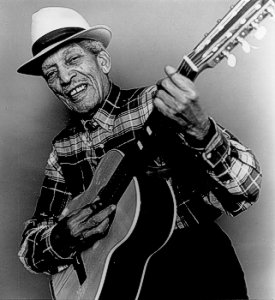12.18.1 Máximo Francisco Repilado Muñoz (Compay Segundo)

Máximo Francisco Repilado Muñoz, Cuban guitarist, clarinetist, and composer, was born on November 18, 1907, in Siboney, Santiago de Cuba province. Known as Compay Segundo, he was a musician with a renowned international reputation.
At the age of five, he moved with his family to Santiago de Cuba. There he learned the trade of cigar rolling and simultaneously took music lessons from a young teacher who introduced him to the secrets of the musical staff, showing him the path to playing an instrument, eventually choosing the clarinet.
In 1929, with the Municipal Music Band and playing that instrument, Compay Segundo made his first trip to Havana. Years later, in 1935, with the great guarachero Ñico Saquito and his Cuban Star, he would visit the Cuban capital again, settling permanently there.
In the 1940s, he joined the Matamoros ensemble as a clarinetist and had the opportunity to work with the great Cuban musician Benny Moré. This was followed by his first trip to Mexico, where he teamed up with another young man from his home region, Lorenzo Hierrezuelo, and together they founded the Los Compadres Duo in 1942.
Lorenzo was the first voice, or Compay Primo; and Repilado, the second voice, or Compay Segundo, his artistic existence forever sealed by that pseudonym. Los Compadres established a popularity phenomenon that lasted until 1955, when Reynaldo Reyezuelo, Lorenzo’s brother, replaced Compay Segundo and formed a new group called Compay Segundo y sus muchachos.
Later, he joined the sextet Los Seis Ases and the Cuarteto Cubanacán. In 1956, he created the group Compay Segundo, with whom he worked until his death. Repilado taught himself to play the tres and guitar, and also played the harmonic, a self-created instrument that blended both instruments. His style of son followed the model of eastern Cuba, incorporating contemporary elements into his lyrics.
In 1996, he was awarded the Félix Varela Order. His international fame came in 1997 with his participation in the album Buena Vista Social Club, which won a Grammy Award. Compay Segundo also appeared in the documentary of the same name, later directed by Wim Wenders.
In April 2002, he shared the stage at the Palais des Congrès in Paris, France, with renowned Cuban sonero Adalberto Alvarez in a concert honoring Cuba’s musical contribution on the 20th anniversary of the founding of Radio Latina. That same year, he was named an Illustrious Son of the city of Nice, Italy.
Francisco Repilado composed sones, guarachas, boleros, and songs, all imbued with rich Caribbean nuances. His works include Sarandonga; La Calabaza; and Saludos, Compay. His Son Chan Chan is irresistible and has been heard even in the Vatican.
Compay Segundo has performed in U.S. cities such as Miami and Washington, D.C., where he traveled as a special guest at the Festival of Traditional American Cultures, sponsored by the Smithsonian Institution. He has also performed in countries such as Spain, England, Switzerland, Italy, and France.
In his later years he performed numerous times before millions of spectators. Throughout his career, he recorded numerous albums such as: “Sentimiento Guajiro”; “Singing in the Plains”; “Compay Segundo and Compay Primo”, “My Oriental Son”; “The Kings of Son”; “The Compadres”; “Balcony of Santiago”; “Balcony of Santiago (Reissue)”; “Greetings, Compay”; “One Hundred Years of Son”; “Son Del Monte”; “Buena Vista Social Club”; “Anthology” (1997); “The Best of Life”; “Calle Salud” (1999); “I Am From the North”; “Anthology” (2001); “The Flowers of Life” and “Duets” (2002).
He died in Havana at the age of 95.
Francisco Repilado, our Compay Segundo, was a legitimate representative of Cuban identity.








